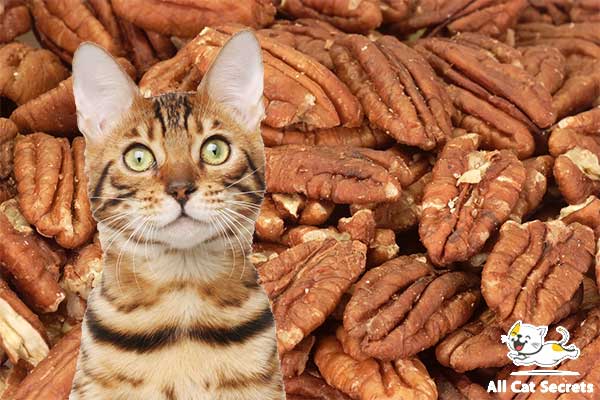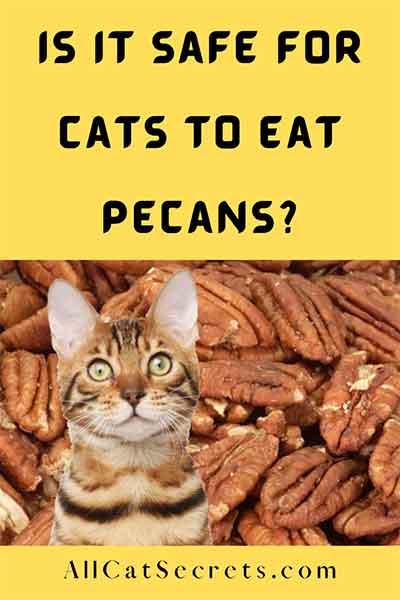Cats are inherently curious animals. Their curiosity often leads them to venture into places they shouldn’t go or consume foods they shouldn’t eat.
It’s for this reason that pet experts advise cat owners against leaving human foods lying around. Your feline friend could easily help himself to unsecured food items. The results can be devastating, especially if the animal happens to have consumed foods known to be toxic to cats.
Nuts are generally ranked among foods that cats can eat in minimal portions. But does this apply to pecan nuts? Can cats eat pecans?
The simple answer is yes, cats can definitely eat pecans. Pecans do not contain toxins that could be immediately problematic for cats. These nuts also boast numerous nutrients that might benefit your kitto. Plus, they’re incredibly tasty, which makes them easy to introduce to cats.
So, there’s no cause for alarm if you discover that your feline friend has helped himself to a handful of pecan nuts.
However, pecans are not a staple ingredient in cat food. That’s for the reason that nuts are plant-based foods, and a cat’s diet primarily comprises animal protein.
Like most nuts, pecans are also laden with fats. High-fat foods are known to wreak havoc in a cat’s stomach and digestive system. Therefore, cats should only consume pecans as an occasional treat.
Table of Contents
Is It Safe for Cats to Eat Pecans?
As we’ve just highlighted, pecan nuts do not contain toxins known to cause immediate health problems for cats. Therefore, it’s logical to infer that these nuts are safe for cats in moderation.
But before we expound on the potential health benefits and side effects of pecans for cats, it would help to start by understanding what these nuts are.
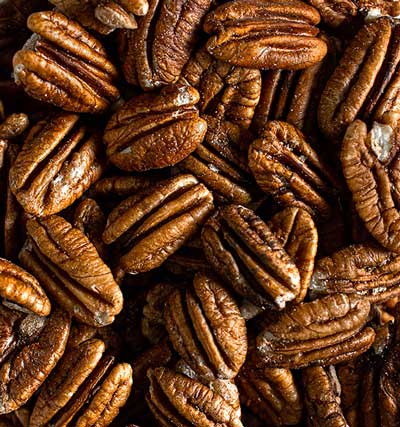
Pecan is taxonomically known as Carya illinoinensis. Carya illinoinensis is a species of hickory trees that grows natively in the Southern United States, which produces edible nuts by the same name.
The tree is predominantly widespread in the states of Georgia, Texas, and New Mexico. It’s classified as a large, deciduous tree that typically towers to a height of 20 – 40 m (66 – 131 ft.), with a canopy spread of 12 – 23 m (39 – 75 ft.).
Still on appearance, pecan nuts resemble walnuts. However, pecans generally appear longer, slenderer, and smoother.
Pecans are also abundant in Mexico. In fact, the country accounts for about half of the world’s total production of pecan nuts.
Pecans are commonly used as a snack. The nuts are famous for their rich, buttery flavor. They’re a staple ingredient in several recipes, such as pecan pie and praline candy.
Peanut nuts are also a common flavor in cookies and desserts. Plus, they’re used in the production of pecan butter and pecan oil.
Now that you’re well-acquainted with what pecans are, you’re probably wondering if these nuts can benefit your cat in any way. The following section shines more light on that.
- Cat food with gravy, made without artificial colors or preservatives
- Purina Fancy Feast canned cat food variety pack crafted with real, high-quality ingredients, like real poultry or beef, to deliver...
- An irresistible, protein-rich Fancy Feast Gravy Lovers cat food taste offering a gourmet turkey, chicken or beef cat food meal...
Last update on 2024-07-14 / Affiliate links / Images from Amazon Product Advertising API
Benefits of Pecans for Cats
To understand the benefits of pecans for cats, it’s best to start by highlighting the nuts’ nutritional value. Now, a 100-gram serving of pecan nuts contains the following nutritional elements;
- Energy – 2,889 kilojoules (690 kilocalories)
- Proteins – 9.17
- Carbohydrates – 13.86
- Dietary fiber – 9.6 grams
- Sugars – 3.97 grams
- Starch – 0.46 grams
- Fat – 71.97 grams
- Monounsaturated fats – 40.801 grams
- Polyunsaturated fats – 21.614 grams
- Saturated fats – 6.18 grams
- Water – 3.52 grams
- Vitamin B1 (Thiamine) – 57% of the recommended daily value (RDV)
- Vitamin B2 (Riboflavin) – 11% of the RDV
- Vitamin B3 (Niacin) – 8% of the RDV
- Vitamin B5 (Pantothenic acid) – 17% of the RDV
- Vitamin B6 – 16% of the RDV
- Vitamin B9 (Folate) – 6% of the RDV
- Vitamin C – 1% of the RDV
- Vitamin E – 9% of the RDV
- Vitamin K – 3% of the RDV
- Manganese – 214% of the RDV
- Zinc – 48% of the RDV
- Phosphorus – 40% of the RDV
- Magnesium – 34% of the RDV
- Iron – 19% of the RDV
- Potassium – 9% of the RDV
- Calcium – 7% of RDV
The benefits of pecan for cats depends on the specific nutrients in the nut. Here are the various ways pecan nuts may benefit your feline friend;
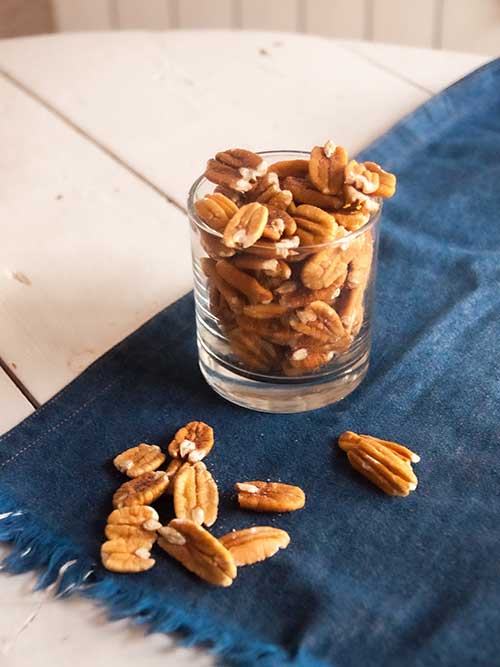
1. Pecans May Aid Your Cat’s Digestion
Pecans are loaded with dietary fiber. A 100-gram serving of raw pecan nuts boasts about 10 grams of fiber.
Fiber plays an instrumental role in aiding digestion. When the nutrient gets to your cat’s stomach, it splits into its two primary forms – soluble and insoluble fiber.
Soluble fiber supports digestion by nourishing gut microbiota – the friendly microorganisms that live throughout the alimentary canal. Studies have shown that supplying gut microbiota with sufficient nutrients might help to keep certain metabolic disorders at bay.
Insoluble fiber doesn’t readily dissolve into your cat’s bloodstream. Instead, much of the fiber moves through the animal’s stomach undigested. In the process, it bulks up your cat’s stool, leading to more frequent bowel movements. Regular bowel movements can help reduce various gastrointestinal issues, such as constipation and diarrhea.
2. Pecans May Support Your Cat’s Muscles and Tissues
Pecans are also rich in protein. Just like fiber, protein makes up roughly 10% of raw pecan nuts.
Now, cats are obligate carnivores. They can obtain all their nutritional requirements from animal protein. That said, it doesn’t harm to supplement your cat’s diet with plant protein.
Protein performs several essential roles in the body. Most notably, it acts as the building blocks for muscles.
Giving your cat protein-rich foods like pecans may help to strengthen the animal’s muscles, tissues, and even bones.
- LIVECLEAR is the first and only cat food with the power to reduce cat allergens simply and safely by neutralizing Fel D 1, a...
- Discovered through over a decade of research, Pro Plan LIVECLEAR cat food significantly reduces the major allergen in cat hair and...
- Salmon is the first ingredient in this high protein dry cat food for skin and coat care
Last update on 2024-07-15 / Affiliate links / Images from Amazon Product Advertising API
3. Pecans May Aid Your Cat’s Brain Development
Pecan nuts contain nearly all vitamins. The nuts are particularly high in vitamin B1, also known as thiamine.
Vitamin B1 plays a crucial role in a baby’s brain development. That makes pecans incredibly beneficial for pregnant cats and nursing cats.
Besides aiding brain development, thiamine also plays key roles in nerve signaling, muscle development, and heart function.
4. Pecans May Promote Your Cat’s Bone and Skeletal Growth
Raw pecans contain a whopping 214% of the nuts’ recommended daily value of manganese. Although these values are mainly based on humans, it’s easy to extrapolate them to our feline friends. That’s because humans and cats have a nearly-similar metabolic system.
Manganese helps in the formation of bones and connective tissues. Incorporating manganese-rich foods like pecans into your cat’s diet may go a long way in aiding bone development.
Manganese is also involved in the formation of blood clotting factors and sex hormones. Plus, it can work synergistically with thiamine to aid brain and nerve function.
5. Pecans May Boost Your Cat’s Immunity
Like most nuts, pecans are high in antioxidants. Antioxidants are compounds that boost immunity by preventing the oxidative damage caused to body cells by free radicals.
A common antioxidant in pecans include ellagic acid. This acid has been linked to reduced risks of some cancers.
Pecans also boast significant quantities of flavonoids, an antioxidant associated with reduced risks of diabetes, heart disease, and some cancers.
Zinc is yet another antioxidant in pecans that your cat may benefit from. This mineral is particularly effective against inflammatory conditions. It might also help to decelerate the natural aging process.
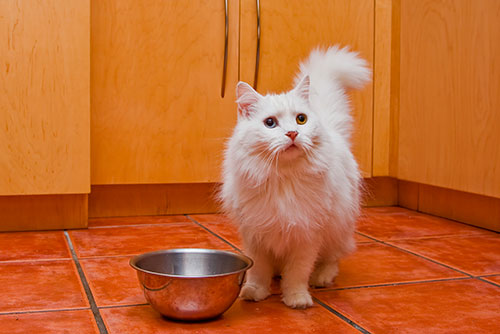
Potential Issues With Pecans for Cats
The biggest problem with pecans for cats is the high-fat content in these nuts. Fat comprises about 70% of raw pecans.
Fatty foods are a major risk factor for overweight and obesity. Such foods may also increase the risks of other chronic diseases, including heart disease and diabetes.
Maybe you’ve always wondered, can diabetic cats eat pecans?
Diabetic cats can eat pecans. Pecans have a relatively low glycemic index, making them less likely to increase your cat’s blood sugar levels dramatically. However, you probably shouldn’t share pecans with a diabetic cat. That’s because the high-fat content in pecans may increase your cat’s weight, and obesity is a known risk factor for type 2 diabetes. The same applies to cats with other chronic conditions like heart disease and obesity.
Are pecans safe for overweight cats?
As we’ve just indicated, pecans are not safe for overweight or obese cats. These nuts are loaded with fats, which could make your obese or overweight cat pack up even more weight.
What about cats with pancreatitis? Can pancreatitic cats have pecan nuts?
Absolutely not. High-fat foods are notorious for inducing or aggravating pancreatitis, an inflammation of the pancreas. When your pancreas becomes inflamed, the organ’s efficiency reduces dramatically, resulting in compromised digestion.
Symptoms of pancreatitis include;
- Upper abdominal pain
- Nausea and vomiting
- Appetite loss
- Elevated heart rate
- Bloating
- Fat in stool
- Fever
- SmartBlend of high-quality ingredients in the digestive care cat food starts with real salmon along with accents of carrots and...
- High levels of protein in Purina ONE Tender Selects Blend adult dry cat food with salmon help support your cat's strong muscles,...
- Is Purina ONE good for cats? This natural dry cat food with added vitamins, minerals and nutrients and no artificial flavors or...
Last update on 2024-07-14 / Affiliate links / Images from Amazon Product Advertising API
Another problem with fatty foods is their laxative effects. Unless your cat is so constipated that you need to apply mild laxative to induce bowel movements, giving the animal too many pecans can trigger unnecessary bouts of diarrhea.
The only saving grace is that much of the fat content in pecans is monounsaturated fats and polyunsaturated fats. Saturated fats make up less than 10% of the nuts’ total fat composition.
Monounsaturated fats and polyunsaturated fats are considered healthier than saturated fats. That’s mainly due to their positive effects on cholesterol levels.
However, note that any fatty food is potentially harmful to cats, despite the specific fats the food contains. That underscores the importance of practicing moderation when considering sharing some pecan nuts with your cat.
The following are other common issues with pecan nuts for cats;
1. Allergies
Nuts are infamous for inducing allergies in pets. But can we say the same about pecans? Are cats allergic to pecans?
Most cats will not develop allergic reactions to pecans. However, your cat might just happen to be an exception to the rule. That’s especially considering that pecans are plants and a cat’s natural diet predominantly comes from animal products.
The symptoms of pecan allergy are nearly similar to those of other common allergens. Examples include;
- Digestive issues like vomiting and diarrhea
- Fever
- Sneezing and/or coughing
- Runny nose and/or eyes
- Hotspots
- Irritability
However, note that pecans will only induce allergies in cats if ingested. Allergic reactions upon physical contact are unheard of.
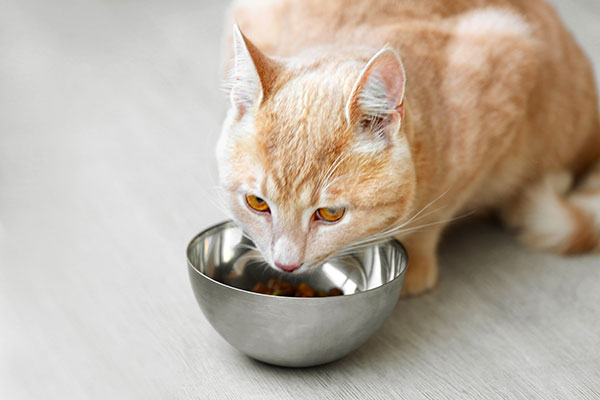
2. Kidney Issues
We’ve already examined the various health implications of high-fat foods like pecans for cats.
Kidney disease is another major health concern of feeding too much pecan to your feline friend. It’s worse for processed pecans, which usually contain significant amounts of fats and salt.
Consuming salted foods has been shown to cause sodium poisoning in cats, a medical condition known to affect kidney functioning. Salt poisoning in cats is particularly disastrous for cats with kidney disease.
The condition produces several symptoms, including;
- Nausea and vomiting
- Appetite loss
- Diarrhea
- Lethargy
- Incoordination
- Excessive thirst sensation, followed by frequent urination
- Tremors and seizures
- Coma, which might result in death
Are Pecans Poisonous To Cats?
Pecans do not contain any chemicals known to cause immediate toxicity in cats. Therefore, it’s logical to infer that pecans are not poisonous to cats.
However, that doesn’t make these nuts entirely safe either. As we’ve already examined, numerous things could go wrong if you serve pecans to your feline friend with careless abandon.
That begs the question, can pecans kill cats?
Your cat will probably not drop dead after snacking on a handful of pecan nuts. However, these nuts can trigger a host of adverse effects if offered to cats in excess. Without timely medical intervention, the negative effects of pecans might eventually result in your cat’s death.
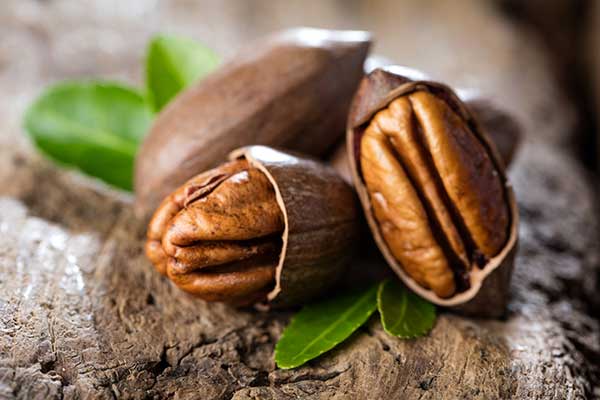
Are Pecans Bad For Cats?
As to whether pecans are bad or good for cats is an individual decision. Having gone through a number of health benefits and potential issues with pecans for cats, it should be easy to determine whether these nuts are good or bad for your feline friend.
But should you decide to share pecans with your kitto, remember to observe the cardinal rule of moderation. Note that your cat will only enjoy the benefits of pecans if he consumes these nuts in moderation.
What Happens If Cats Eat Pecans?
In most cases, nothing will happen if your cat only snacks on a few pecan nuts. However, several things could go wrong if the animal consumes worrying amounts of pecan.
That begs the question, can pecans hurt cats?
Although we’ve already mentioned it, there’s no harm in reiterating that pecans can harm cats if fed in excess. Side effects range from vomiting and diarrhea to allergic reactions and abdominal pain. In severe cases, pecans might aggravate preexisting conditions like kidney disease and heart disease.
If you suspect that your cat has consumed more pecans than his fair share, the best course of action is to take the animal for a professional examination ASAP.
- Works as a dog food topper - For pet parents looking for an alternative to capsules, raw treats, or soft chews, all it takes is a...
- A tasty & body nourishing treat for cats & dogs - Essential fatty acids for a healthy coat.
- Powerful Omega Fatty Acids - This premium fish oil liquid formula is loaded with the healthy Omega-3 fatty acid (with epa and dha)...
Last update on 2024-07-14 / Affiliate links / Images from Amazon Product Advertising API
How to Serve Pecans to Cats
Cats can eat pecan raw or cooked.
Feeding raw pecans to your cat allows the animal to benefit from a maximum number of nutrients in these nuts.
Start by cleaning the nuts to rid them of any debris and cling-on parasites. Next, chop the pecans into smaller portions. That minimizes choking hazards. If you’ve always wondered, ‘can cats eat chopped pecans,’ you’ve got your answer right there.
After chopping raw pecans into bite-size portions, mix the nuts into your cat’s regular diet.
If you prefer cooked pecans for cats, you’d also begin by washing the nuts in clean water and then chopping them into smaller pieces.
After that, boil or steam the nuts over moderate heat. Avoid adding salt, fats, or spices to the food. These compounds are all potentially toxic to cats.
Whether you serve pecans to your cat raw or cooked, the most important thing is to keep the portions low.
Perhaps you’re wondering, how much pecans is too much?
Well, there’s no definite answer to that question. The amount of pecan nuts to share with your cat depends on several aspects, including the animal’s age, body mass, activity levels, and overall health condition.
Adult cats can obviously consume more pecans than kittens. The same logic applies to cats with bigger body mass and those with higher activity levels.
Lastly, healthier cats can consume pecans. However, avoid serving pecans to cats with underlying medical conditions.
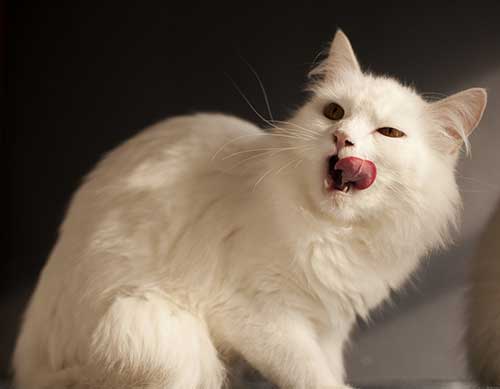
Can cats eat roasted pecans?
Cats can eat roasted pecans. However, roasting deprives these nuts of their water content. So, you’re better sticking to raw or boiled and steamed pecans for cats.
Can cats eat pecan pie?
Cats can eat pecan pie provided that you can vouch for the safety of the other ingredients in the pie.
Can cats eat pecan butter?
Much like pecan pie, cats can eat pecan butter if the butter contains ingredients generally deemed safe and beneficial for cats.
How to Minimize Your Cat’s Interactions With Pecans
If you’d rather not feed pecans to your cat, there are several tips you can implement to reduce the animal’s interactions with these nuts.
First off, start by feeding your cat a diet well-balanced in proteins and vitamins. That may help to reduce his curiosity for pecans.
Also, consider keeping pecans out of your cat’s reach. Tightly-sealed cans and locked kitchen cabinets may come in handy here.
Other tips to prevent your cat from consuming pecans behind your back include;
- Avoiding eating or cooking with pecans in your cat’s presence
- Discouraging your cat from feeding on table scraps
- Discouraging your guests from feeding your cat any unapproved foods
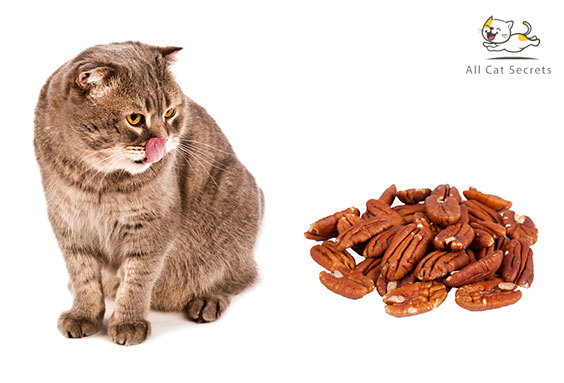
Other Frequently Asked Questions About Cats and Pecans
Can cats eat pecan shells?
Cats shouldn’t eat pecan shells as these shells are tough and might pose choking hazards.
Can kittens eat pecans?
So far, we’ve examined the health benefits and potential side effects of pecans for cats in general.
But does the same apply to kittens? Can kittens have pecans?
Kittens can have pecans. However, they should only consume these nuts in moderation. That’s due to their more sensitive digestive system.
Conclusion
Pecans are loaded with essential minerals and vitamins that cats can enjoy. But like all plant-based foods, pecans are only beneficial to cats as an occasional treat.
Checkout Our Favorite Cat Products
1. Best Online Course For Cat Parents
Our favorite: The Cat Language Bible (How to Finally Understand And Speak to Your Cat) – A new form of cat to human communication that many cat owners have dreamed about… but few have actually thought possible.
2. Best Immune Support For Cats
Our favorite: Tomlyn Immune Support – Best Supplement for Cats and Kittens.
3. Best Cat Treats
Our favorites: LIFE ESSENTIALS All Natural Freeze Dried Chicken And Sheba Meaty Tender Sticks – Both are Great.

